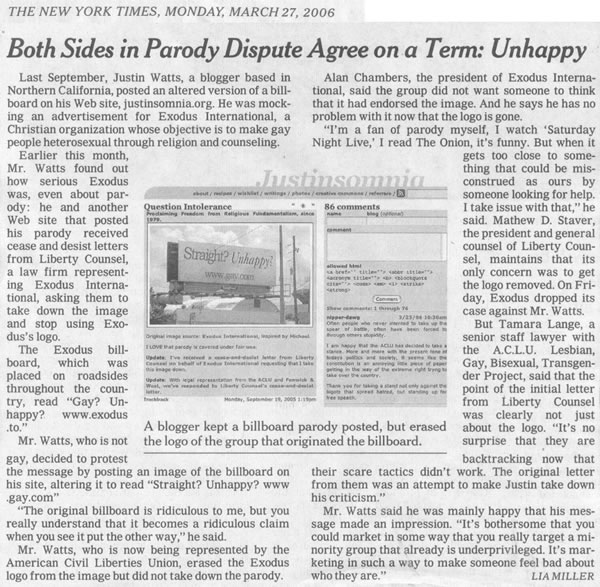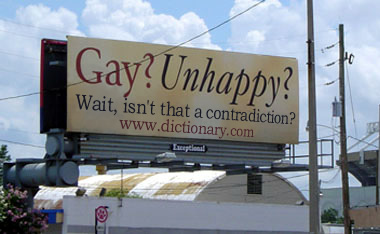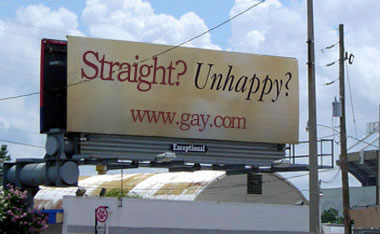 Twenty days ago I received a cease and desist letter from Liberty Counsel, a law firm representing Exodus International, a group that claims to offer gay people “freedom from homosexuality through the power of Jesus Christ.” They demanded that I take down a parody image I’d created (seen above) of an offensive, anti-gay billboard which they’d put up around the country, on the grounds that it infringed upon their intellectual property rights.
Twenty days ago I received a cease and desist letter from Liberty Counsel, a law firm representing Exodus International, a group that claims to offer gay people “freedom from homosexuality through the power of Jesus Christ.” They demanded that I take down a parody image I’d created (seen above) of an offensive, anti-gay billboard which they’d put up around the country, on the grounds that it infringed upon their intellectual property rights.
I immediately contacted the ACLU, EFF, and anyone else that I thought might be interested or would be able to lend a hand. The ACLU looked into the facts of the case and very generously offered to represent me in partnership with the law firm of Fenwick & West. Free of charge. And I don’t mean a single lawyer, I mean a team of four experts in Intellectual Property, Free Speech, Copyright, and GLBT Rights.
As an aside: for anyone who’s graciously offered me financial assistance, might I suggest becoming a member of the ACLU?
With their amazing assistance, we’ve responded to Liberty with the following brilliant and frankly inspiring letter defending my parody as a constitutionally protected form of free speech (here’s a PDF version). It’s worth a read. It gave me chills.
For more information, please see the ACLU’s case profile and press release on the matter. Thanks.
Re: Exodus International’s Cease-and-Desist Letter to Justin Watt
Dear Mr. Staver:
This firm, together with the ACLU Foundation of Northern California and the national ACLU Foundation’s Lesbian & Gay Rights Project, represents Justin Watt. Contrary to the allegations in your March 1, 2006, letter, Mr. Watt’s parody of Exodus International’s (Exodus) anti-gay billboard has not infringed Exodus’s rights. Mr. Watt’s use of Exodus’s own images to criticize its philosophy—and to send a counter message that happiness cannot be obtained by trying to change one’s sexual orientation—falls squarely within the First Amendment protection of speech embodied in the right to make “fair use” of copyrighted materials. Indeed, the Supreme Court has recognized that “parody may quite legitimately aim at garroting the original, destroying it commercially as well as artistically.” Campbell v. Acuff-Rose Music, Inc., 510 U.S. 569, 592 (1994). While Exodus has the right to articulate its views on sexual orientation, copyright does not immunize its work from comment or criticism. It thus provides Exodus no entitlement to censor Mr. Watt’s speech on the same subject.
A. Factual Background.
Exodus describes itself as an organization promoting the message of “Freedom from homosexuality through the power of Jesus Christ.” It claims to “challenge[] those who uphold homosexuality as a valid orientation.” In June 2005, it widely disseminated and posted on its website a press release publicizing a billboard campaign. The release included a photo of Exodus’s Orlando billboard that read “Gay? Unhappy? www.exodus.to.”
Justin Watt strongly disagrees with Exodus’s philosophy and decided to parody the Exodus campaign on his personal blog, justinsomnia.org. Using the photo on Exodus’s website, Mr. Watt created a new version that reads “Straight? Unhappy? www.gay.com.” He posted this version on his blog page entitled “Question Intolerance,” followed with a caption: “Original image source: Exodus International . . . . I LOVE that parody is covered under fair use.”
B. Under Applicable Copyright Law, Mr. Watt’s Conduct Is Lawful.
Mr. Watt’s use of Exodus’s own expression to criticize Exodus’s message is exactly the sort of speech protected by the fair use doctrine. Section 107 of the copyright statute states that fair use “for purposes such as criticism [and] comment . . . is not an infringement of copyright.” “The exceptions carved out for these purposes are at the heart of fair use’s protection of the First Amendment, as they allow later authors to use a previous author’s copyright to introduce new ideas or concepts to the public.” SunTrust Bank v. Houghton Mifflin Co., 268 F.3d 1257, 1264 (11th Cir. 2001) (holding commercial parody of Gone with the Wind to be fair use because “copyright does not immunize a work from comment and criticism”). Fair use is one of the “built in First Amendment accommodations” in the copyright law, “affording considerable ‘latitude for scholarship and comment,’ and even for parody.” Eldred v. Ashcroft, 537 U.S. 219-20 (2003) (citation omitted). Thus, fair use exists so as not to “stifle the very creativity which [the copyright] law is designed to foster.” Campbell, 510 U.S. at 577.
Here, application of the four factors used to analyze fair use demonstrates that Mr. Watt’s speech is unquestionably protected. See 17 U.S.C. § 107(1)-(4).
1. Watt’s parody is both noncommercial and transformative.
The first fair use factor considers “the purpose and character of the use,” focusing on whether or not the use is commercial and/or transformative. Although the Supreme Court has recognized that even commercial parody may be protected, the non-commercial and purely critical purpose of Mr. Watt’s use strongly supports fair use. See Sony Corp. v. Universal Studios, 464 U.S. 417, 451 (1984). Mr. Watt does not sell his version of the photo. He merely uses it as part of an effort to “Question Intolerance” as a portion of a wide-ranging personal blog. This use, which has “nothing but a critical aspect,” qualifies as the sort of “parody pure and simple” that is most entitled to protection. Campbell, 510 U.S. at 523.
Moreover, even commercial parody can be fair use if it “adds something new, with a further purpose or different character, altering the first with new expression, meaning, or message,” as opposed to merely superseding the original. See Campbell, 510 U.S. at 579. In Campbell, the rap group 2 Live Crew borrowed lyrics and music from the copyrighted song “Pretty Woman.” The “transformative” nature of the new work, which commented on and ridiculed the original, supported a finding of fair use. Id. Similarly, in Leibovitz v. Paramount Pictures Corp., 137 F.3d 109, 114 (2d Cir. 1998), the court found transformative use where a movie ad mocked an original photo of a naked, pregnant and serious Demi Moore by inserting the head of smirking comedian Leslie Nielsen instead. Here, just as Leslie Nielsen’s smirking face plausibly ridiculed the seriousness of the original Demi Moore photo, the starkly different text “Straight” and “www.gay.com” added by Mr. Watt ridicules the original Exodus photo, highlighting the absurdity of suggesting that people can—or should—change their sexual orientation. This transformative use, coupled with its non-commercial nature, weighs doubly in favor of fair use.
2. Watt’s parodic use offsets any creativity in Exodus’s work.
Exodus’s original photo—appearing as it does in a news release and reciting only two words and a website address—reflects only a modicum of creativity. However, even for the most creative works, the second statutory factor—the “nature of the copyrighted work”—“is given little weight in parody cases.” SunTrust, 268 F.3d at 1271. Analysis of this factor “is not much help” since parodies “almost invariably” (and justifiably) refer to expressive and publicly known works in order to make their point. See Campbell, 510 U.S. at 586. Thus, this factor is at least neutral in the fair use analysis.
3. Watt’s image contains an appropriate amount of the original.
Parody also necessarily uses “at least enough” identifiable features of the original to allow an audience to recognize the target. See Campbell, 510 U.S. at 588. There is no requirement “that parodists take the bare minimum amount of copyright material necessary to conjure up the original work.” SunTrust, 268 F.3d at 1273. “[O]nce enough has been taken to assure identification, how much more is reasonable depends on [1] the extent to which the [work’s] overriding purpose and character is to parody the original and [2] the likelihood that the parody may serve as a market substitute for the original.” Id., quoting Campbell, 510 U.S. at 588. Here, Mr. Watt’s use is parody, pure and simple. With no possibility of substitution for the original, the amount used is not unfair. In fact, Mr. Watt used only about half of the original Exodus photo, omitting the portion including a Station 441 sign. He chose a different, but still compatible, font for the word “Straight” and the web address, and made the web address red instead of black. Thus, this factor weighs in favor of fair use.
4. Watt’s use causes no cognizable harm to the market for Exodus’s work.
“When a lethal parody, like a scathing theater review, kills demand for the original, it does not produce a harm cognizable under the Copyright Act.” Because the parody may rightfully seek to demean the original, “the role of the courts is to distinguish between ‘biting criticism that [merely] suppresses demand [and] copyright infringement, which usurps it.'” Campbell, 510 U.S. at 523, quoting Fisher v. Dees, 794 F.2d 432, 438 (9th Cir. 1986). Here, Mr. Watt’s altered version cannot possibly substitute for the original, as it communicates a contradictory message. If Mr. Watt’s image has any “effect on the market or value of” Exodus’s original work (the fourth fair use factor), it would be merely permissible suppression of demand resulting from criticism of its content. In other words, to the extent Mr. Watt’s parody is successful in undermining Exodus’s anti-gay message, its success supports a finding of fair use.
In any event, the Exodus photo was part of a June 2005 press release about a billboard scheduled for removal in December 2005. The usefulness of that photo and that billboard has expired. The fourth factor therefore weighs heavily in favor of fair use.
On balance, (1) Watt’s use is both non-commercial and transformative criticism, weighing heavily in favor of fair use; (2) any creativity in content is offset by Watt’s parodic usage, and is therefore neutral; (3) the extent of the use is justifiable, weighing in favor of fair use; and (4) the use does not substitute for the original photo, again weighing heavily in favor of fair use. This is a compelling example of legitimate parody, in every respect.
C. Applicable Trademark Law Does Not Preclude Mr. Watt’s Use.
A trademark claim also would fail because, among other reasons, Mr. Watt has made no commercial use of the mark, as required to implicate the trademark statutes. “[T]he sweep of a trademark owner’s rights extends only to injurious, unauthorized commercial uses of the mark by another. Trademark rights do not entitle the owner to quash an unauthorized use of the mark by another who is communicating ideas or expressing points of view.” L.L. Bean, Inc. v. Drake Publishers, Inc., 811 F.2d 26, 29 (1st Cir. 1987). There is also no likelihood of confusion between the original and the parody. See 15 U.S.C. § 1125(a)(1). Here, Mr. Watt’s blog prominently disclosed that the use was parody and provided a link to the original. Further, to the extent that Exodus could show that the use of a faint “e” watermark on its billboard had any recognition by a segment of the public, Watt’s message was so antithetical to Exodus’s mission that no one recognizing the watermark would likely have been confused as to sponsorship; no one would think the parody was sponsored by Exodus. Nonetheless, the watermark was not the crux of Mr. Watt’s parody message. Thus, despite the lack of trademark infringement but as an accommodation to Exodus’s purported concern, Mr. Watt removed the watermark from his photo after receiving your letter.
D. Conclusion.
Exodus may not find the parody humorous and may dislike people mocking its views. Nevertheless, Mr. Watt’s parody is precisely the free expression that the copyright laws protect. There is no colorable legal basis for any claim against Mr. Watt. Mr. Watt therefore expects that Exodus will abandon its attempts to censor a viewpoint with which it disagrees.
Sincerely,
Laurence F. Pulgram
cc: Justin Watt
Ann Brick, Esq.
Update: Ex-Gay Watch, which also received a cease-and-desist letter from Liberty Counsel for republishing my parody, had the Los Angeles-based law firm of Irell & Manella send Liberty a response letter on their behalf today as well. Here’s my favorite part:
“Just as the ex-gay movement often uses weak science in support of its agenda, so Exodus is using weak law to curtail Mr. Airhart’s freedom of speech. It’s unfortunate that many of Exodus’s targets have no choice but to turn to “Wikipedia” to resist Exodus’s bullying tactics. Yet this is one instance in which “Wikipedia” appears to have a better understanding of First Amendment principles than Exodus’s own counsel.”
—Robert N. Klieger
Update: For the curious, and so that this letter might be a more useful, informative, and educational tool for anyone who finds themselves in similar circumstances, I’ve linked all of the cases cited above to the full opinions on Findlaw (or where ever I could find a full opinion). Here’s the complete case citation list:
 It seems that Exodus International, the “largest Christian referral and information ministry” in the ex-gay movement has hired Liberty Counsel, “a legal organization dedicated to advancing its organizers’ conceptions of religious freedom the sanctity of human life and the traditional family,” to try and get me to take down my PARODY of Exodus’ “Question Homosexuality” billboard campaign. Umm, no.
It seems that Exodus International, the “largest Christian referral and information ministry” in the ex-gay movement has hired Liberty Counsel, “a legal organization dedicated to advancing its organizers’ conceptions of religious freedom the sanctity of human life and the traditional family,” to try and get me to take down my PARODY of Exodus’ “Question Homosexuality” billboard campaign. Umm, no.
Here’s the text of the letter:
Dear Mr. Watt:
Liberty Counsel is a national public interest law firm. We have presented many briefs before the United States Supreme Court, and we have argued before the High Court and in state and federal courts throughout the nation. Liberty Counsel has offices in Florida, Virginia and hundreds of affiliate attorneys licensed in all 50 states and the District of Columbia. We frequently provide assistance to various organizations including Exodus International (“Exodus”).
It has recently come to our attention that your web site, http://justinsomnia.org, is using an image that you admit was taken from the Exodus web site. As you are aware, that image is located at
http://justinsomnia.org/2005/09/question-intolerance/.
You appear to believe that the stolen image is exempt from federal intellectual property laws as a “parody” due to “fair use.” Unfortunately, the intricacies of federal law cannot adequately be covered on “Wikipedia” due to the variety of facts addressed by courts in numerous cases. Your use of the image is indeed a violation of copyright law and is not covered by “fair use.” Nearly the entire image file from the Exodus web site was is used on your web site with only two changes. You changed “Gay” to “Straight?” and “www.exodus.to” to “www.gay.com.” Furthermore, your altered image substantially diminishes the potential value of the original image as utilized by Exodus on billboards across America and online. Moreover, your infringing activity creates the false impression that Exodus is sponsoring or endorsing the altered billboard, in violation of the Lanham Act, 15 U.S.C. § 1125, as it contains the “E” logo mark that belongs to Exodus. You have not been licensed or authorized to use either the image or the logo belonging to Exodus.
We are confident that you will understand our insistence that you immediately cease use of the image on your web site or in any other form. Please confirm your agreement to this request, and please note your confirmation that no other use is being or will be made of the images or logo, by signing and returning an original signature on a copy of this letter at the address shown above, no later than March 15, 2006. We appreciate your anticipated cooperation with this request.
Sincerely,
/s/
Mathew D. Staver, Esq.
All legal advice is welcome and appreciated.
Update: Ex-Gay Watch also receives a C&D.
Update: In a stroke of brilliance, Jason further parodies the Exodus billboard. Religious? Litigious?
Update: One of the more interesting aspects of this letter is the law firm’s mention (and dismissal) of Wikipedia. In an attempt to be OVERT about my act of PARODY, I linked to Wikipedia’s entry on Fair use. Liberty Counsel asserts that:
…the intricacies of federal law cannot adequately be covered on “Wikipedia”…
Though their rationale for this statement is so opaque as to be unintelligible:
…due to the variety of facts addressed by courts in numerous cases.
Hmm. Yeah. Thanks. Care to elaborate? A rough paraphrase: “This isn’t true because of facts. And st00f.”
I thought the folks at Wikipedia would be amused by their inclusion in my cease-and-desist letter. They responded thusly:
Indeed, Wikipedia cannot give legal advice, as is indicated in our legal disclaimer:
http://en.wikipedia.org/wiki/Wikipedia:Legal_disclaimer
However, best of luck with your legal issues, and thanks for letting us know about the mention!
Update: With legal representation from the ACLU and Fenwick & West, we’ve responded to Liberty Counsel’s cease-and-desist letter.




